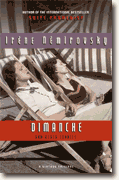Dimanche and Other Stories
Irene Nemirovsky
book reviews:
· general fiction
· chick lit/romance
· sci-fi/fantasy
· graphic novels
· nonfiction
· audio books
· author interviews
· children's books @
curledupkids.com
· DVD reviews @
curledupdvd.com
newsletter
win books
buy online
links
home
for authors
& publishers
for reviewers

 |
Dimanche and Other Stories Irene Nemirovsky Vintage Paperback 304 pages April 2010 |
|
Tales told of lives led just before a historic tragedy subsumed all, or nearly all, the world in which the tales are set may seem daunting to mind and mood. Yet the quality of Irene Nemirovsky’s writing and her skill at sculpting vivid characters - she was a storyteller par excellence - help quell any sense that the reading might be more a reminder of highly depressing 20th-century history than an opportunity to experience a sharply honed literary sensibility. Irene Nemirovsky’s life was tragically foreshortened. It began in 1903 in Kiev, Russia, and ended in 1942 in Auschwitz.
“She hadn’t always been a bad-tempered old woman – the children had forgotten that...“When a debilitating fever strikes this most vulnerable and venerable family member, the outcome is not what this reader - and perhaps many others - might have expected. And that’s merely one of the pleasures in reading Nemirovsky. She shunned the obvious for the unexpected in plot turns. Another evocation of the power of emotional ties - “The Spell” – revolves around members of a charmingly nonconformist family living in the countryside of czarist Russia, actual blood-relatives tumbled together with a perpetual parade of visitors. “The table was never cleared; the food was heavy but it was excellent. Some of the guests would be finishing their dessert as others would be beginning their soup...”One visitor is a highly observant girl-child from a more conformist, strait-laced household. Nominally, she is in the care of her nursemaid, Mademoiselle, but the prevailing indulgent atmosphere excites, dazzles, and frees the child from normal strictures. “It was great fun. Signs of disorder, dilapidation and neglect were everywhere, yet at the same time it was full of life and the most welcoming home I have ever been in... “Don’t these people ever work?” asked Mademoiselle who, being foreign, had strange ideas about life.”Startlingly, “The Spell” seems to channel the vibe that struck U.S. culture in the 1960s: comfort from being closer to Mother Earth, defiance of conformity, tolerance. How thought-provoking to find a like concept described by Nemirovsky within a trove of European-set stories said to have been written between 1934 and 1942. The darkest of the 10 stories comprising the collection is “Brotherhood,” which explores the chasm – financial, social, cultural – that separated Europe’s pre-Holocaust Jewish population. It centers on a chance meeting between two men representing that separation. One has been fortunate from birth – “He had never known need or dread of what the next day would bring.” The other, asked his occupation, says, “I do a bit of everything, of course. For now, I’m working in the hat trade. As long as I have a work permit, you see. When they take it away from me. I’ll start selling again.” The men part, with nothing having changed for either. Yet a brief line spoken by the latter is particularly poignant considering the unspeakably awful events ahead: “Lord, if only we could have a quiet life!” Originally published on Curled Up With A Good Book at www.curledup.com. © Norma J. Shattuck, 2010 |
| Also by Irene Nemirovsky: |
|
|
|
 Click here to learn more about this month's sponsor! |
|
| fiction · sf/f · comic books · nonfiction · audio newsletter · free book contest · buy books online review index · links · · authors & publishers reviewers |
|
| site by ELBO Computing Resources, Inc. | |
 Of the ten stories included here, the longest, “Flesh And Blood,” is an evocation of family life with all its layering of lifelong resentments and cast-in-stone expectations. Looming dominant among long-established rituals is Sunday dinner with the widowed matriarch at the family home – a routine delineated as both stultifying and oddly soothing in its sameness. The aged hostess might well have been a caricature, but Nemirovsky deftly side-stepped that by showing the mother/grandmother’s sharp self-awareness.
Of the ten stories included here, the longest, “Flesh And Blood,” is an evocation of family life with all its layering of lifelong resentments and cast-in-stone expectations. Looming dominant among long-established rituals is Sunday dinner with the widowed matriarch at the family home – a routine delineated as both stultifying and oddly soothing in its sameness. The aged hostess might well have been a caricature, but Nemirovsky deftly side-stepped that by showing the mother/grandmother’s sharp self-awareness.